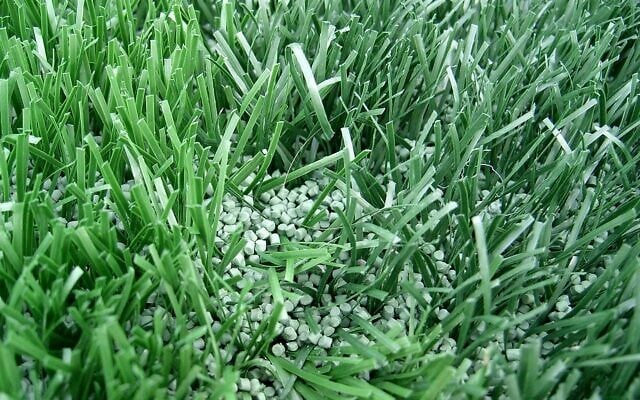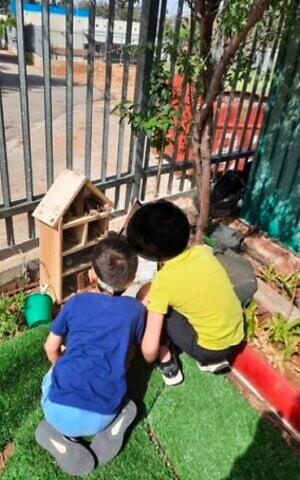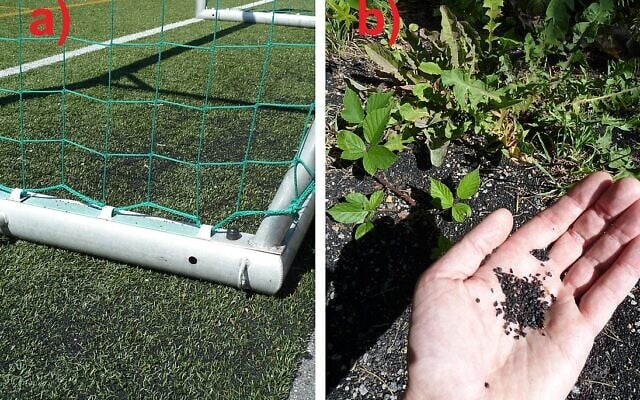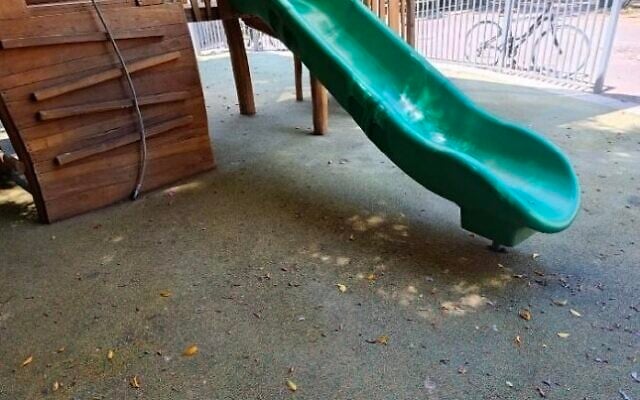


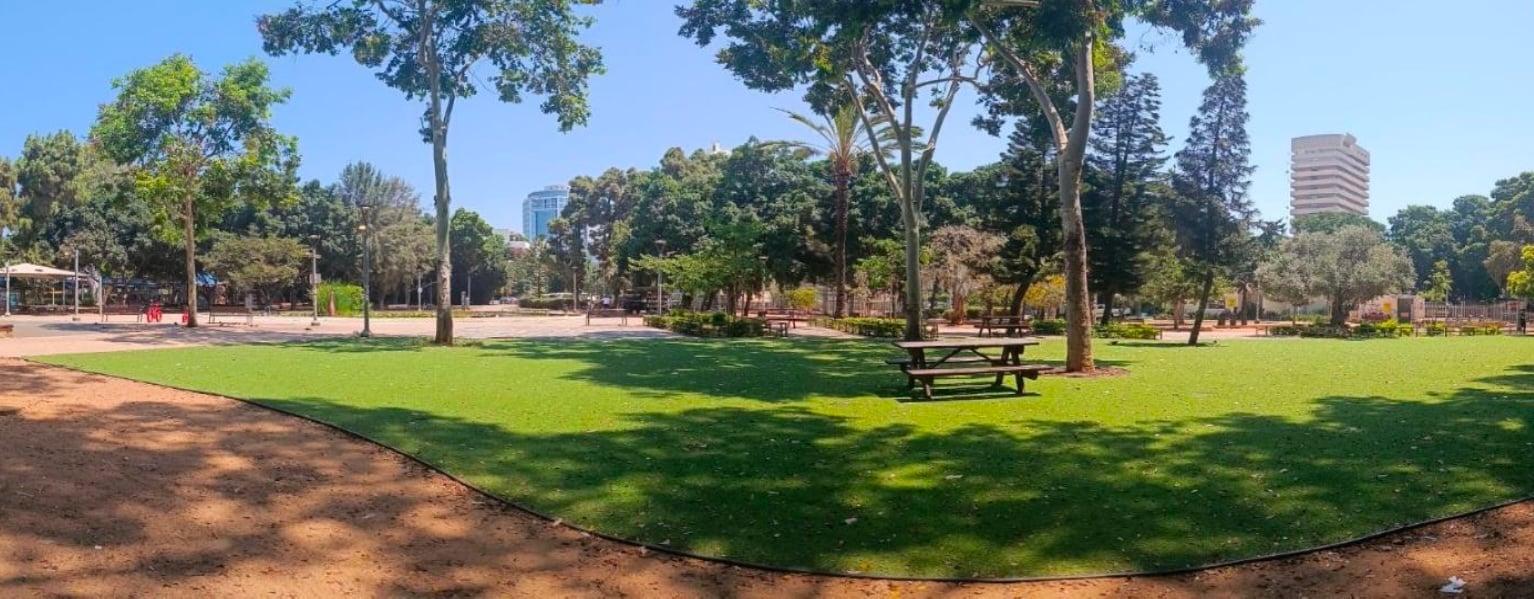
In the run-up to the new school year, three environmental organizations, including the President’s Climate Forum, appealed Monday to government ministries to work together to ban synthetic turf, rubber surfaces, and recycled car tires from educational institutions, playgrounds, and parks, warning they can be toxic and even carcinogenic.
The President’s Climate Forum, the environmental advocacy organization Adam, Teva V’Din, and the Green Network wrote to the Education, Economy, Interior, Health, and Environmental Protection Ministries and the Standards Institute, noting that regulators and local authorities around the world were already banning and restricting the use of these materials.
First known as Astroturf after its installation in 1966 in the Houston Astrodome, synthetic grass has been widely used throughout the world to save the water and maintenance costs of real grass.
Rubber surfaces have replaced sand around play equipment, and old tires have been ‘upcycled’ and used as planters and play equipment to reduce landfill.
It is the chemicals in the tires, and in the shredded tire material used as cushioning infill in synthetic grass and rubber flooring, that are causing growing controversy.
Out of many studies conducted in recent years, the three organizations cite a position paper by the School of Medicine at Mount Sinai Hospital in the United States that was updated in May, and a 2021 Israeli study that probed hazardous chemicals in rubber surfaces in playgrounds in eight Israeli cities.
Despite this, they found there were no explicit prohibitions or restrictions on synthetic grass or rubber granule use in Israel, with some Education Ministry directives being contradictory.
The position paper from the Children’s Environmental Health Center of the Icahn School of Medicine at Mount Sinai cited studies that found known carcinogenic chemicals and neurotoxins, such as benzene and lead, in synthetic turf based on recycled rubber tires, and in some alternative materials.
Among the hazardous materials, it noted the presence of chemicals from the PFAS family in the grass fibers and synthetic grass surfaces. PFAS (Per- and polyfluoroalkyl substances), known as ‘forever chemicals’ because they remain in the body and the environment for so long, have been linked to cancer, nervous system toxicity, cardiovascular disease, thyroid disease, and more.
The Mount Sinai position paper said that having found “significant gaps in the evidence supporting the safety of artificial turf products,” it “strongly” discouraged the use of such products due to the uncertainties surrounding their safety and the “potential for dangerous heat and chemical exposures.”
The Israeli study noted that lead and other heavy metals might have been intentionally added to synthetic turf products to maintain bright colors over time.
It found that 72 percent of samples taken contained quantities of metals that exceeded international standards. It indicated that the hot Israeli climate could help hazardous substances break down relatively quickly and leach into the environment.
All these findings, said the letter from the three organizations, were consistent with publications by the United States Environmental Protection Agency (EPA) and the Dutch Institute for Public Health and the Environment, which also found chemicals in synthetic turf.
“Children are exposed to these chemicals in various ways, such as ingestion, inhalation, absorption through the skin, and open wounds,” the letter went on. “Children, especially the youngest, put their hands and objects in their mouths, an action that increases exposure. They also incur more injury than adults….” Physiological characteristics also put children at increased risk, the letter said, as they breathe faster than adults and therefore inhale more chemicals, and sweat less than adults, meaning they eliminate fewer toxins. Chemical damage in the body continued into the teenage years, when the reproductive and nervous systems were developing, they wrote.
The letter also drew attention to the environmental price of these materials, saying plastic-derived synthetic grass not only releases hazardous chemicals into the soil and groundwater, but also breaks down into micro- and nano-plastics, which litter the environment and enter human and animal bodies.
One study (not cited in the letter) found that so-called “crumb rubber” infill of artificial turf fields accounted for around 38% of microplastics in the European environment derived from “intentionally added” products.
The organizations’ letter goes on to state that, compared to natural vegetation, which helps reduce heat, synthetic grass acts in the opposite way. The production process emits greenhouse gases, the grass itself heats up more than its surroundings, and it ends up in a landfill.
The writers recommend using natural materials such as coconut fibers, cork, and sand instead.
In 2023, the European Union passed a regulation to ban the sale of products containing “intentionally added microplastics,” including “granular artificial turf infill.” This will come into force in 2031. Cities in the US are starting to follow suit. In January 2024, in Millbrae, California, an ordinance entered into force prohibiting the installation of new synthetic grass and requiring the removal of existing artificial grass and its replacement with existing natural landscaping as soon as signs of wear and tear are identified or if the grass does not allow for drainage during storms.
In January, the Kfar Saba City Council in central Israel passed a regulation to ban the use of synthetic grass in all public spaces and educational institutions.
The letter details the steps each ministry and the Israel Standards Institute should take to eradicate the materials, from updating standards and guidelines to replacing existing surfaces with natural coverings only.

